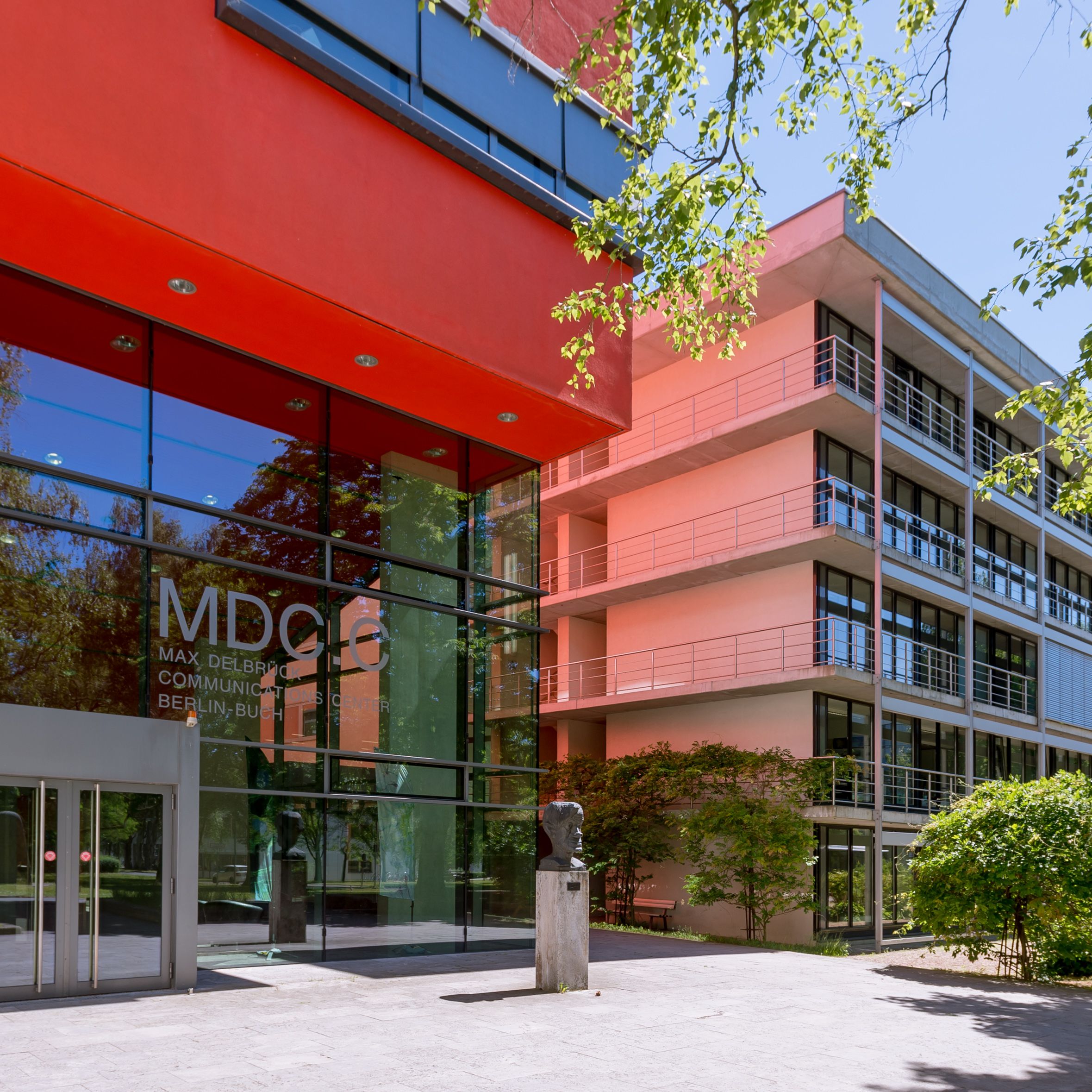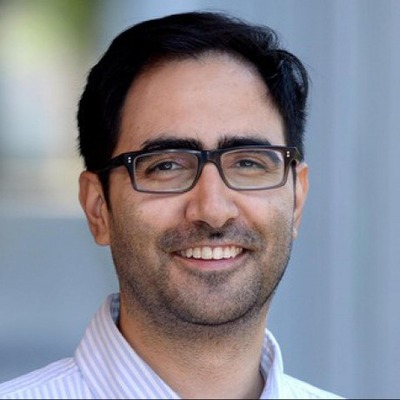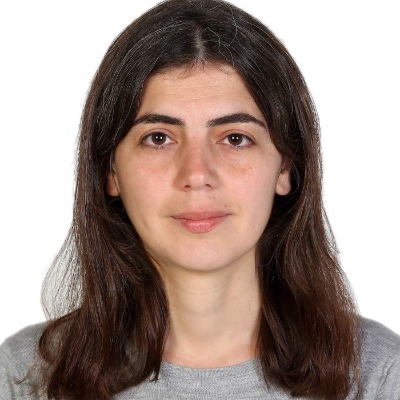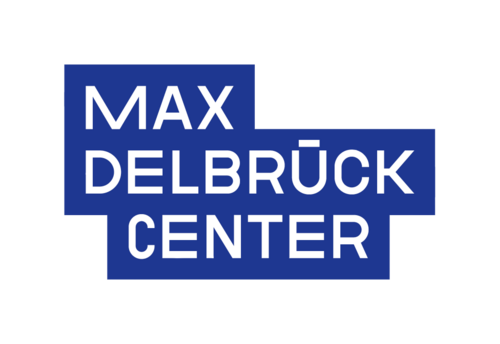Verstehen, wie Leben funktioniert: Am MDC erforschen Wissenschaftler die molekularen Grundlagen von Gesundheit und Krankheit – von individualisierter Medizin bis zu KI-gestützter Diagnostik.
Mit HIDAs Mobilitätsprogrammen können Data-Science-Talente am MDC an zukunftsweisenden Forschungsprojekten im Bereich der Biomedizin mitwirken. Das Ziel: ein tieferes Verständnis für unseren Körper.

Über die Helmholtz-Gemeinschaft
Die Helmholtz-Gemeinschaft
Die Helmholtz-Gemeinschaft ist die größte Wissenschaftsorganisation Deutschlands. Unsere übergreifenden Forschungsprogramme verbinden die 18 Helmholtz-Zentren miteinander.
Jedes Zentrum verfügt über eigene wissenschaftliche Schwerpunkte und Infrastrukturen. Die Forschung ist thematisch in sechs strategische Bereiche gegliedert.
- Energie
- Erde und Umwelt
- Gesundheit
- Information
- Luftfahrt, Raumfahrt & Verkehr
- Materie
Das Max-Delbrück-Centrum für Molekulare Medizin (MDC) ist eine der weltweit führenden Forschungseinrichtungen für biomedizinische Wissenschaften. Hier arbeiten interdisziplinäre Teams zusammen, um die komplexen Prozesse des menschlichen Körpers zu entschlüsseln. Ihr Ziel ist es, zu verstehen, welche Faktoren das Gleichgewicht in Zellen, Organen und dem gesamten Organismus regulieren oder stören. Dieses Wissen ermöglicht neue Ansätze zur Prävention, Früherkennung und maßgeschneiderten Behandlung von Krankheiten.
Forschungsschwerpunkte:
- Systemmedizin und Herz-Kreislauf-Erkrankungen
- Gene, Zellen und zellbasierte Medizin
- Molekulare Prozesse und Therapien
- Integrative Biomedizin
- Krebsforschung und Immuntherapien

Die Standorte
Die Standorte
- Hauptstandort: Berlin-Buch
- Weiterer Standort: Berlin-Mitte
- Forschungskooperationen:
- Experimental and Clinical Research Center (ECRC)
- Berlin Institute of Health (BIH) in der Charité
- Deutsches Zentrum für Herz-Kreislauf-Forschung (DZHK)
Kompetenzen des MDC im Bereich Data Science & KI
Das MDC nutzt modernste KI-Methoden und datengetriebene Ansätze, um komplexe biologische Systeme zu analysieren. Forschende entwickeln innovative Algorithmen zur Krankheitsvorhersage, zur Optimierung von Therapien und zur Analyse großer medizinischer Datensätze.
- KI-gestützte Mustererkennung in Genom- und Proteindaten
- Automatisierte Bildanalyse für die Krebsdiagnostik
- Maschinelles Lernen zur Modellierung von Krankheitsverläufen
- Entwicklung von Simulationsmodellen für personalisierte Therapien
- Multimodale Datenintegration zur Optimierung biomedizinischer Forschung
An die 1200 Mitarbeitenden aus 64 Ländern sind am MDC beschäftigt.
Bewerbung
Sie möchten an der Helmholtz Munich forschen und arbeiten? Dann bewerben Sie sich jetzt für das HIDA Mobility Program!
!
Kontaktieren Sie Ihren potenziellen Betreuer oder Ihre potenzielle Betreuerin bitte vorab per E-Mail, um ein Forschungsprojekt vorzuschlagen und zu besprechen. Reichen Sie erst nach dieser Klärung Ihre Bewerbung ein.
Weitere Informationen zu den Bewerbungsregularien finden Sie hier!
Hinweis für externe Bewerber:
Bei Fragen zu Bewerbungsformalitäten und organisatorischen Abläufen wenden Sie sich bitte direkt an Ihr Heimatinstitut.
Die Hosts am MDC
Lernen Sie hier einige potentielle Gastgeberinnen und Gastgeber am MDC kennen und erfahren sie mehr über deren jeweilige Data Science-Forschung.
Bitte beachten Sie: Die hier aufgeführte Liste zeigt lediglich eine Auswahl möglicher Gastgeber.
Darüber hinaus können Sie auch eigenständig potenzielle Hosts im Zentrum kontaktieren und mit ihnen eine Teilnahme am HIDA Mobility Program vereinbaren.
Wenn Sie Fragen haben, senden Sie bitte eine E-Mail an: hida@helmholtz.de
Sie möchten selbst gerne Helmholtz-Gastgeber werden und suchen nach Unterstützung für Ihr Forschungsprojekt? Dann wenden Sie sich ebenfalls an die oben genannte E-Mail Adresse.

Altuna Akalin
Bioinformatics and Omics Data Science
Ansprechpartner

Short summary of your group's research: We have a broad interest in gene regulation, specifically transcriptional regulation and association of transcriptional regulation with epigenomics. We are aiming to use data intensive computational methods to uncover patterns in gene regulation relating to cell differentiation and complex diseases.
What infrastructure, programs and tools are used in your group? HPC, statistical and machine learning tools implemented in Python or R
What could a participant of the HIDA Trainee Network learn in your group? How could he or she support you in your group? Participant can learn domain specific data processing techniques and provide support in machine learning applications.

Claudia Chien
Clinical Neuroimmunology
Ansprechpartner

Short summary of your group's research: Our group follows a translational clinical research approach. This means that we try to transfer new developments and findings from basic research directly into clinical work. We mainly focus on research in multiple sclerosis and neuroinflammatory diseases, however the MRI Team within AG Neuroimmunology has several projects that investigate other disorders. These imaging analysis methods and techniques are translatable to many different central nervous system studies.
What infrastructure, programs and tools are used in your group? Berlin Center for Advanced Neuroimaging, NeuroCure Clinical Research Center, Neuroimmunological Colloquium, Berlin Institute of Health, Bernstein Center for Computational Neurosciences
What could a participant of the HIDA Trainee Network learn in your group? How could he or she support you in your group?A guest researcher would learn how to investigate MRI parameters from clinical studies from real patients and volunteers. The researcher would be expected to support our group with set up of analysis pipelines of raw MRIs using high performance computing (https://www.hpc.bihealth.org/) resources and learn how to quality control clinically relevant data.

Laleh Haghverdi
Computational methodologies and omic analytics
Ansprechpartner

Short summary of your group's research: We are a computational biology group working with a range of single-cell omic data modalities including proteomics, transcriptomics, epigenetics and genomics to study biological systems such as development, haematopoiesis or leukaemic stem cells and their niche.Establishment of efficient computational methodologies for analysis of large single-cell omic data sets, resolution of complex lineage trees, data integration and interpretation across multiple modalities and assays as well as mathematical formulation of the applied methods are of central interest in the group.
What infrastructure, programs and tools are used in your group? Python, R, computational tools for single-cell data analysis
What could a participant of the HIDA Trainee Network learn in your group? How could he or she support you in your group? Hight-throughtput measurements of molecular states at the single-cell level are today accessible for biological and clinical studies, thanks to new and still evolving technological developments. Located in the cool central Berlin district, we are an interdisciplinary group trained in physics, mathematics, bioinformatics and molecular biology working together to address several aspects of computational analysis of such newly emerging datasets. We are interested in extending our machine learning and data science collaborations and contacts.

Jakob Metzger
Quantitative Stem Cell Biology
Ansprechpartner

Short summary of your group's research: We are an interdisciplinary group focusing on a quantitative understanding of human neurodevelopment using stem-cell derived organoids. Using machine learning to analyze the difference between normal and pathological processes, we aim to dissect the mechanisms of neurodevelopmental and neurodegenerative diseases.
What infrastructure, programs and tools are used in your group? Python, R, machine learning
What could a participant of the HIDA Trainee Network learn in your group? How could he or she support you in your group? As an interdisciplinary group, we apply a range of computational tools to the analysis of biological data, including imaging and genomics data. Participants can learn data analysis techniques and provide support in developing new data science pipelines, such as machine learning applications.



